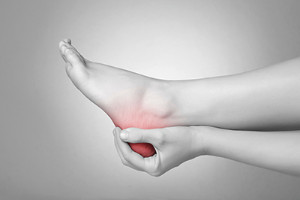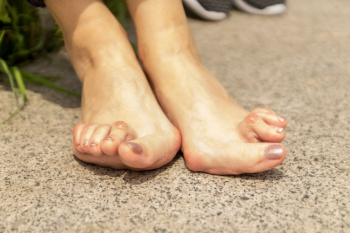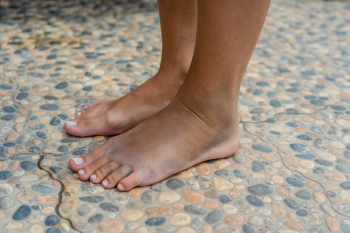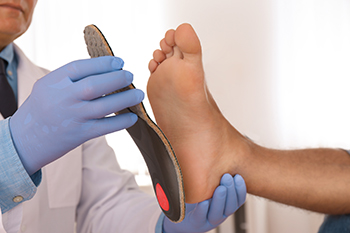Items filtered by date: January 2025
Common Types and Causes of Heel Pain

Heel pain is a widespread issue that can stem from various conditions, affecting different areas of the heel. One of the most common causes is plantar fasciitis, which occurs when the plantar fascia, a thick band of tissue running along the bottom of the foot, becomes inflamed. This condition often results in sharp pain at the bottom of the heel, particularly when taking the first steps in the morning. Another cause is heel spurs, which are bony growths that form on the heel bone, typically due to prolonged pressure or inflammation from plantar fasciitis. Heel pain can also affect the back or side of the heel. Achilles tendinitis, for example, causes pain in the back of the heel where the Achilles tendon attaches. Additionally, conditions like bursitis can lead to pain on the back or sides of the heel. If you have heel pain, it is suggested that you promptly contact a podiatrist who can accurately diagnose and offer a personalized treatment plan.
Many people suffer from bouts of heel pain. For more information, contact Anas Khoury, DPM of North Eastern Foot & Ankle Specialists. Our doctor can provide the care you need to keep you pain-free and on your feet.
Causes of Heel Pain
Heel pain is often associated with plantar fasciitis. The plantar fascia is a band of tissues that extends along the bottom of the foot. A rip or tear in this ligament can cause inflammation of the tissue.
Achilles tendonitis is another cause of heel pain. Inflammation of the Achilles tendon will cause pain from fractures and muscle tearing. Lack of flexibility is also another symptom.
Heel spurs are another cause of pain. When the tissues of the plantar fascia undergo a great deal of stress, it can lead to ligament separation from the heel bone, causing heel spurs.
Why Might Heel Pain Occur?
- Wearing ill-fitting shoes
- Wearing non-supportive shoes
- Weight change
- Excessive running
Treatments
Heel pain should be treated as soon as possible for immediate results. Keeping your feet in a stress-free environment will help. If you suffer from Achilles tendonitis or plantar fasciitis, applying ice will reduce the swelling. Stretching before an exercise like running will help the muscles. Using all these tips will help make heel pain a condition of the past.
If you have any questions please contact our office located in Passaic, NJ . We offer the newest diagnostic and treatment technologies for all your foot and ankle needs.
Do Your Child's Feet Hurt?
How Podiatrists Can Help People With Rheumatoid Arthritis

Rheumatoid arthritis, or RA, affecting the feet can cause significant pain, stiffness, and joint damage, making daily activities challenging. Risk factors include genetics, smoking, obesity, and an inactive lifestyle, all of which can worsen RA symptoms. While there is no cure, a healthy diet rich in anti-inflammatory foods like fruits, vegetables, and omega-3 fatty acids can help reduce flare-ups and support joint health. Regular, low-impact physical activity, such as walking, swimming, or stretching, keeps joints flexible and prevents stiffness. Wearing proper footwear and orthotics also play a vital role in minimizing discomfort and supporting foot alignment. A podiatrist can provide tailored care, including custom orthotics, footwear recommendations, and strategies for managing foot pain. If you have RA that affects your feet, it is suggested that you seek routine care from a podiatrist for help in maintaining mobility, preventing deformities, and improving your overall quality of life.
Because RA affects more than just your joints, including the joints in your feet and ankles, it is important to seek early diagnosis from your podiatrist if you feel like the pain in your feet might be caused by RA. For more information, contact Anas Khoury, DPM of North Eastern Foot & Ankle Specialists. Our doctor will assist you with all of your podiatric concerns.
What Is Rheumatoid Arthritis?
Rheumatoid Arthritis (RA) is an autoimmune disorder in which the body’s own immune system attacks the membranes surrounding the joints. Inflammation of the lining and eventually the destruction of the joint’s cartilage and bone occur, causing severe pain and immobility.
Rheumatoid Arthritis of the Feet
Although RA usually attacks multiple bones and joints throughout the entire body, almost 90 percent of cases result in pain in the foot or ankle area.
Symptoms
- Swelling and pain in the feet
- Stiffness in the feet
- Pain on the ball or sole of feet
- Joint shift and deformation
Diagnosis
Quick diagnosis of RA in the feet is important so that the podiatrist can treat the area effectively. Your doctor will ask you about your medical history, occupation, and lifestyle to determine the origin of the condition. Rheumatoid Factor tests help to determine if someone is affected by the disease.
If you have any questions please feel free to contact our office located in Passaic, NJ . We offer the newest diagnostic and treatment technologies for all your foot and ankle needs.
Custom Orthotics Help Runners Protect Their Feet

Runners, meet your game-changer: Custom Orthotics. Every stride matters, and with Custom Orthotics, you can ensure optimal foot alignment, reducing stress on joints and muscles. They help absorb shock, protect against injuries, and can even enhance your running efficiency. Whether you're sprinting short distances or conquering marathons, Custom Orthotics provide the support and balance your feet crave. Call today for more information.
Understanding Foot Pain from Bruises

Foot pain caused by bruises, such as contusions and hematomas, can be both uncomfortable and concerning. These injuries occur when blood vessels beneath the skin are damaged, typically from a direct impact or trauma, like dropping something heavy on your foot or stubbing your toe. Contusions result in pain, swelling, and discoloration, while a hematoma occurs when blood collects in a confined area, creating larger, more painful swelling. The primary symptoms of bruises on the foot include pain, swelling, and a visible darkening or redness of the skin. If the pain persists or if there is significant swelling, a podiatrist can assess the injury and ensure there are no underlying fractures. This type of doctor can also recommend appropriate treatments for faster healing. If you have this condition, it is suggested that you schedule an appointment with a podiatrist.
Foot Pain
Foot pain can be extremely painful and debilitating. If you have a foot pain, consult with Anas Khoury, DPM from North Eastern Foot & Ankle Specialists. Our doctor will assess your condition and provide you with quality foot and ankle treatment.
Causes
Foot pain is a very broad condition that could be caused by one or more ailments. The most common include:
- Bunions
- Hammertoes
- Plantar Fasciitis
- Bone Spurs
- Corns
- Tarsal Tunnel Syndrome
- Ingrown Toenails
- Arthritis (such as Gout, Rheumatoid, and Osteoarthritis)
- Flat Feet
- Injury (from stress fractures, broken toe, foot, ankle, Achilles tendon ruptures, and sprains)
- And more
Diagnosis
To figure out the cause of foot pain, podiatrists utilize several different methods. This can range from simple visual inspections and sensation tests to X-rays and MRI scans. Prior medical history, family medical history, and any recent physical traumatic events will all be taken into consideration for a proper diagnosis.
Treatment
Treatment depends upon the cause of the foot pain. Whether it is resting, staying off the foot, or having surgery; podiatrists have a number of treatment options available for foot pain.
If you have any questions, please feel free to contact our office located in Passaic, NJ . We offer the newest diagnostic and treatment technologies for all your foot care needs.
Orthotics and Plantar Fasciitis

Orthotics are an effective treatment for plantar fasciitis, a common condition that causes heel pain. These custom-designed shoe inserts provide the necessary support to relieve pressure on the inflamed plantar fascia and promote proper foot alignment. Orthotics work by redistributing the weight and reducing strain on the heel which helps alleviate pain and prevent further damage. They also offer arch support that can help correct flat feet or high arches, two common contributors to plantar fasciitis. By cushioning the foot and ensuring better posture, orthotics reduce the impact of walking or standing, allowing the plantar fascia to heal more efficiently. With consistent use, orthotics can improve mobility, prevent flare-ups, and help individuals return to normal activities with reduced discomfort. If you have plantar fasciitis, it is suggested that you are under the care of a podiatrist who can determine if orthotics are right for you.
If you are experiencing discomfort in your feet and would like to try custom orthotics, contact Anas Khoury, DPM from North Eastern Foot & Ankle Specialists. Our doctor can provide the care you need to keep you pain-free and on your feet.
What Are Custom Orthotics?
Custom orthotics are inserts you can place into your shoes to help with a variety of foot problems such as flat feet or foot pain. Orthotics provide relief and comfort for minor foot and heel pain.
Over-the-Counter Inserts
Shoe inserts come in a wide variety and are used to treat foot pain, heel pain, and minor problems. For example, arch supports can be inserted into your shoes to help correct overarched or flat feet, while gel insoles are often used because they provide comfort and relief from foot and heel pain by alleviating pressure.
Prescription Orthotics
If over-the-counter inserts don’t work for you or if you have a more severe foot concern, it is possible to have your podiatrist prescribe custom orthotics. These high-quality, custom inserts are designed to treat problems such as abnormal motion, plantar fasciitis, and severe forms of heel pain. They can even be used to help patients suffering from diabetes by treating foot ulcers and painful calluses and are usually molded to your feet individually, which allows them to provide full support and comfort.
If you're experiencing minor to severe foot or heel pain, it’s recommended to speak with your podiatrist about the possibility of using custom orthotics or shoe inserts. A podiatrist can determine which type of custom orthotic or shoe insert is right for you and help you take the first steps toward being pain-free.
If you have any questions please contact our office located in Passaic, NJ . We offer the newest diagnostic and treatment technologies for all your foot and ankle needs.
Causes of Foot and Ankle Injuries From Skateboarding

Foot and ankle injuries are common among skateboarders due to the high-impact and dynamic movements involved in the sport. One major cause of injury is inversion sprains, where the foot rolls outward, and eversion sprains, where the foot rolls inward. These sprains can vary in severity, ranging from grade 1, which involves mild stretching of ligaments, to grade 2, where ligaments are partially torn, and grade 3, which involves a complete ligament rupture. In addition to sprains, overuse injuries can occur from repetitive motions, such as pushing off or landing incorrectly, leading to stress fractures or tendinitis. Skateboarders may also suffer from ankle instability, which can increase the likelihood of sprains. If you enjoy skateboarding and have endured an injury, it is suggested that you contact a podiatrist who can offer effective treatment solutions and injury prevention tips.
Sports related foot and ankle injuries require proper treatment before players can go back to their regular routines. For more information, contact Anas Khoury, DPM of North Eastern Foot & Ankle Specialists. Our doctor can provide the care you need to keep you pain-free and on your feet.
Sports Related Foot and Ankle Injuries
Foot and ankle injuries are a common occurrence when it comes to athletes of any sport. While many athletes dismiss the initial aches and pains, the truth is that ignoring potential foot and ankle injuries can lead to serious problems. As athletes continue to place pressure and strain the area further, a mild injury can turn into something as serious as a rupture and may lead to a permanent disability. There are many factors that contribute to sports related foot and ankle injuries, which include failure to warm up properly, not providing support or wearing bad footwear. Common injuries and conditions athletes face, including:
- Plantar Fasciitis
- Plantar Fasciosis
- Achilles Tendinitis
- Achilles Tendon Rupture
- Ankle Sprains
Sports related injuries are commonly treated using the RICE method. This includes rest, applying ice to the injured area, compression and elevating the ankle. More serious sprains and injuries may require surgery, which could include arthroscopic and reconstructive surgery. Rehabilitation and therapy may also be required in order to get any recovering athlete to become fully functional again. Any unusual aches and pains an athlete sustains must be evaluated by a licensed, reputable medical professional.
If you have any questions please feel free to contact our office located in Passaic, NJ . We offer the newest diagnostic and treatment technologies for all your foot and ankle needs.

